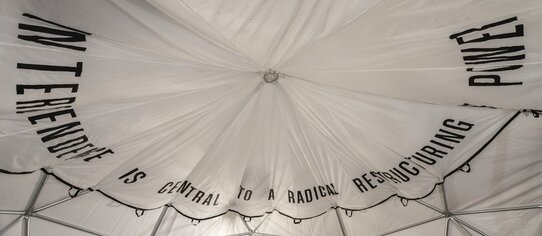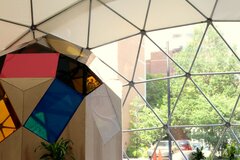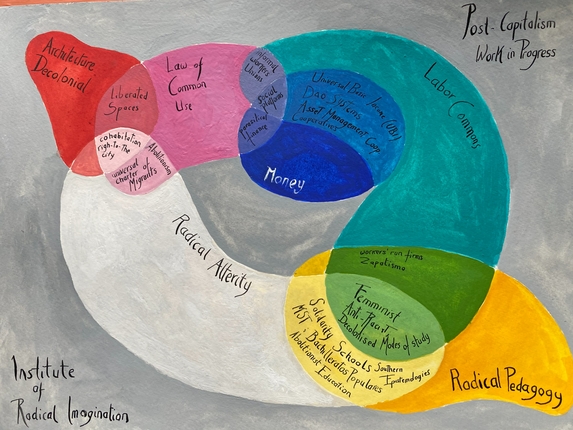Weaving Dreams into Realities

Learning object by Jeanne van Heeswijk | Toward Sanctuary Dome (Philadelphia Assembled, 2017) with Parachute (Carmen Papalia, 2019)
With contributions by Armen Avanessian, Centre for Plausible Economies (Kathrin Böhm, Kuba Szreder), Maciej Chmara, Maria Hlavajova, Institute of Radical Imagination, Laut Kollektiv, Sophie Mak-Schram, Massimiliano Mollona, Claude Nassar, Zeyno Pekünlü, Vishnu Vardhani Rajan, Dmitry Vilensky
17 | 09 | 2022 - 10 | 12 | 2022 Whitebox Zeppelin University
Sponsered by Baden-Württemberg Stiftung | Fränkel Stiftung | Sparkasse Bodensee
Weaving Dreams into Realities explores how imagination can be rediscovered as a starting point for joint actions, collective movements, and as catalysts for social and political change today. From September to December 2022, the programme gives spaces to artists, activists, academics and other practitioners which in very different ways set political imagination as the premise of their work and contest the immense material as well as imaginative desolation. The invited practitioners facilitate the creation of affective environments, dynamic and diversified public spaces in order to “radicalize the local”, fight for concrete forms of international solidarity, commoning and possibilities of mutual support, and seek to nourish interdependent and community-based economic systems.
The programme aims to sheds light on what has hold on the imaginary, it explores the potential as well as danger of radicalization, and examines how (neo)colonial and illiberal imageries keep bleeding into the immaterial as well material fabric of the world.
In workshops, talks and sensual artistic arrangements the relation between imagination and practice will be explored, dreams of liberation from the past will be revisited, current practices of resistance and common struggle against planetary destruction, will be discussed, in order to reclaim imaginations as a political sphere, for what does not yet exist, but could.
Jeanne van Heeswijk
In September 2022 artist Jeanne van Heeswijk and with her the Toward Sanctuary Dome (Philadelphia Assembled, 2017), a geodetic structure for personal and collective refuge, will transform the White Box into a space for sharing stories, resting, and learning about what it might mean to caring not only for oneself but also for others. The Installation Toward Sanctuary Dome had its first iteration within the Philadelphia Assembled project in Philadelphia Museum of Art in 2017; in its iteration in the context of Weaving Dreams into Realities Towards Sanctuary Dome creates a space for a variety of workshops, talks, and screenings and invites to also use the space as an affecting environment for teaching, learning and exchange.
Institute of Radical Imagination (IRI)
In October the Institute of Radical Imagination (IRI) will inhabit the Dome to host a workshop and public presentation, inviting exchange, discussion, and convivial gathering. IRI is a nomadic institute which brings together art, activism and pedagogy in order to inspire a transition towards a post-capitalist society. In the context of Weaving Dreams into Realities IRI members like the Turkish artist Zeyno Pekünlü, the Russian artist and activist Dmitry Vilensky and the Italian anthropologist and curator Massimiliano Mollona address the issue of international solidarity at a time of global conflict and authoritarianism. They do so through their different experiences within IRI and in the light of their diverse activist, artistic and pedagogical practices.
Centre for Plausible Economy
In November 2022 the founders of the Centre for Plausible Economy Kuba Szreder and Kathrin Böhm are invited to present their work and to host a workshop that aims to reimagine economic systems in the arts and beyond. The Centre for Plausible Economies facilitates playful artistic interventions in the everyday economies. In so doing, it scrutinises the economic underpinnings of contemporary art. Recognising the already existing but undervalued diversity of art and economy in general, they develop new artistic tools to make this diversity visible, to rethink and reorganise both. They visualise diverse economies through artistic mappings and drawings, that invite for visual thinking.
Further Contributions
In addition to these main contributions, a diverse programme will invite students and the local and international public to experience, move, think and map together. A workshop on Dreamscaping with students from Zeppelin University led by Jeanne van Heeswijk together with performance artist Vishnu Rajan, and educator Sophie Mak-Schram aims to develop a “stewardship curriculum” for the use of Toward Sanctuary Dome. In cooperation with the European research project FEINART, the workshop Institution Making with curator Maria HLavajova and artist Jeanne van Heeswijk and the concert Falling to No Ground by musician and philosopher Claude Nassar will take place in the Dome as part of the international Summer School in September. Furthermore, the student initiative Laut Kollektiv invites to a weekly intersectional feminist study group. At the end of the semester students of the curatorial practice course turn to the notion of the radical by curating images and video works that have been made in proximity to activist practices, in conjunction with social movements and reflect as well as share the struggle for radical change in times of planetary crisis.
By bringing perspectives from art, activism, pedagogy, and political economy into conversation, and by moving between analyses, imagination and prefiguration the programme invites to imagine mutual and cooperative life-forms, that is, concrete alternatives to the current regime of patriarchal and racial capitalism.
The workshop and lecture programme and the creation of atmospheres, images and situations allow not only intellectual reflection but also for sensuous modes of addressing and experiencing the social.
Learning object by Jeanne van Heeswijk
Toward Sanctuary Dome (Philadelphia Assembled, 2017)
with Parachute (Carmen Papalia 2019)

What do you invest your time and care in? If you were part of a space of daring political dreaming, what would you want the space to hold?
Thinking through what it means to offer and receive sanctuary, Toward Sanctuary Dome is a geodesic structure for personal and collective refuge. The dome-like construction is designed so as to provide a specific atmosphere for gathering and sharing stories, resting, and learning about what it might mean to give care for each other. As there is no singular way of providing sanctuary, Toward Sanctuary Dome creates a space that explores on an intimate scale, what creating and caring for robust sanctuaries might look like in the face of current geopolitical and environmental crises.In its first iteration within the Philadelphia Assembled project in Philadelphia Museum of Art in 2017, Toward Sanctuary Dome was constructed both indoors as a temporary structure and outdoors as a larger public, semi-permanent building. While both domes were intended to encourage city dwellers to join and share their thoughts about how the city could offer community asylum for marginalized peoples, the open-air installation aimed at actualizing these discussions into a concrete practice of offering sanctuary. In the second iteration in the context of Trainings for the Not-Yet at bak Utrecht, the dome was used for variety of trainings, as well as screenings, presentations, and ongoing conversations. In this iteration the dome is used for workshops, public presentation, study groups and screenings, for teaching sessions and contemplation. The Toward Sanctuary Dome seeks to opens a space for collective studying and training in what it means to offer and receive sanctuary for imagining and enacting a more just world.
In this iteration of Toward Sanctuary Dome, the original interior is complemented with seats by Eid Jabroun, originally from Syria, who has worked at De Voorkamer together with Salah Uqleh building and refurbishing objects, including wood and metal stools. Realized at the studio of Thijs Rijkers.
Conceived and realized by Mayada Alhumssi, Traction Company (Miguel Horn, John Greig, Sedakial Gebremedhin, Connie Ambridge, Jeff Dentz, and Joshua Koffman), the Philadelphia Assembled Sanctuary Stewards, and the Sanctuary Working Group collaborators.
Artist Bio
Artist Jeanne van Heeswijk has become internationally known for the collective development of dynamic and diverse public spaces that "radicalize the local." Her long-term, community-embedded works follow a post-autonomous art tradition. They combine performative actions, discussions, and other forms of organizing and pedagogy to help communities take charge of their own futures. Their work has been featured in numerous books and publications worldwide, as well as internationally renowned biennials such as Liverpool, Shanghai, and Venice.
Programme
Over the course of four months the Toward Sanctuary Dome will build an environment for an interactive programme with quite different contributions from Selda Asal, Armen Avanessian, Centre for Plausible Economies (Kathrin Böhm, Kuba Szreder), Maciej Chmara, Jeanne van Heeswijk, Maria Hlavajova, Institute of Radical Imagination, Laut Kollektiv, Massimiliano Mollona, Claude Nassar, Zeyno Pekünlü, Vishnu Vardhani Rajan, Dmitry Vilensky and many more.
5.-7.09.
Workshop Dreamscaping by Jeanne van Heeswijk, Vishnu Rajan, and Sophie Mak-Schram
Public presentations by students of Zeppelin University as results of workshops by Armen Avanessian, Maciej Chmara, Jeanne van Heeswijk, Sophie Mak-Schram, Vishnu Vardhani Rajan.
More Information
Starting point of Weaving Dreams into Realities is the workshop Dreamscaping in which Jeanne van Heeswijk together with performance artist Vishnu Rajan, researcher, and educator Sophie Mak-Schram and students from the Zeppelin University will develop a “stewardship curriculum” for the use of Toward Sanctuary Dome (Philadelphia Assembled, 2017). This curriculum will accompany the program for the rest of the year and offers a guideline how to share, hold and maintain the space and builds a ground for collective movement and imagining ways out of the seemingly never-ending crises.
The workshop ends with a public presentation on the 7 th of September, 18:30h CEST in and around the White Box at the Campus Fallenbrunnen, Zeppelin University.
17.09.
Opening
Public presentation by students of Zeppelin University, introduction by Karen van den Berg and Rahel Spöhrer, Summer Party Zeppelin University
More Information
The” Stewardship Curriculum” developed in the workshop Dreamscaping by Jeanne van Jeeswijk, Vishnu Rajan, and Sophie Mak-Schram with students from Zeppelin University will be introduced to the public in the frame of the Summer Party of the Zeppelin University, where Weaving Dreams into Realities will be open to the public for the first time.
22.10.
Solidarity in Times of Conflict – Possibilities, Imaginations, Practices
Workshop and public talk by Massimiliano Mollona, Zeyno Pekünlü, Dmitry Vilensky, Institute of Radical Imagination
More Information

Public Talk and Workshop by the Institute of Radical Imagination (IRI)
On the 22 nd of October the artsprogram of Zeppelin University is inviting to a public talk and workshop with the Institute of Radical Imagination (IRI), an alter-institution operating on the threshold between art, radical pedagogy and activism, with the aim of imagining, and implementing practices of solidarity and commoning across Europe and the Mediterranean. As part of the interdisciplinary programme Weaving Dreams into Realities, IRI members Massimiliano Mollona, who is an anthropologist, curator and author of the book Art/Commons, Turkish activist and artist Zeyno Pekünlü and internationally renowned artist and activist Dmitry Vilensky will host a public talk and workshop, in which they will introduce the work of the Institute of Radical Imagination, invite the public to reflect on the political potential of dreams and imaginaries, and encourage a conversation on international solidarity in times of global conflicts and authoritarianism.
Info
www.instituteofradicalimagination.org
Programme
22.10.2022 | 11.30-13.00 Public Talk | Buchhornplatz 6, 88045 Friedrichshafen
22.10.2022 | 14.00 -17.00 Workshop | Fallenbrunnen 3, 88045 Friedrichshafen
Public Talk and Brunch | 22.10.2022 | 11.30-13.00
In the public talk Zeyno Pekünlü, Dmitry Vilensky and Massimiliano Mollona will introduce the work of the Institute of Radical Imagination in a casual and convivial setting in a student-run space in Friedrichshafen. The talk will give insights on the initial ideas that led to the founding of the Institute and present its manifold activities. IRI was founded at a time of transnational convergence between the so-called movements of the square in the MENA region, Occupy London, and Wall Street, and the experiments of progressive municipalism in Italy, Spain, and Greece. But the global COVID-19 pandemic and the ongoing war in Ukraine have highlighted an emerging divide, between the Mediterranean and Europe. The talk unfolds how IRI is addressing this divide, through relocating the political imaginary and activist practices of the members closer to these conflict zones. In the conversation Mollona, Pekünlü and Vilensky ask whether internationalism and solidarity can be reimagined through learning from the grassroots practices of support and care that were implemented during the Ukrainian war. Particular attention is paid to diasporic artistic communities from Russia and Belarus and other conflict zones that practice forms of commonality and mutual aid that challenge the dominant violent politics.
Workshop | 22.10.2022 | 14.00-17.00
The Workshop will focus in more detail on the possibilities of international solidarity. Pekünlü, Vilensky and Mollona will discuss concrete forms of commoning and mutual support that challenge the violent politics and economies that characterize the current global scenario. The workshop will be set up as a common study space, very practical and hands-on, in which the participants will reflect together on some political terms- such as solidarity, grassroots activism, internationalism, and commoning.
Pekünlü, Vilensky and Mollona will present in turn, a case study drawn from their own experience of research/activism which tackles key dimensions of political solidarity. Pekünlü will discuss the social construction of narratives around Erdogan’s regime, specifically the framing of the regime’s authoritarianism as “fascism” and how the art world normalised unexpected coalitions fed by such narratives. Vilenski will discuss his involvement in militant research, through his involvement in the Narva Emergency School, a transdisciplinary research platform and shelter for artists, writers, researchers, activists, and others, which was created in response to war in Ukraine and growing repression in Russia, Belarus and in other countries where the possibilities of independent critical research are severely limited. Mollona will discuss the solidarity between the labour movement and black and decolonial activism in Brazil, both in the history of slaves’ rebellions and of the anti-dictatorship movement of the 1980s, and through his own experience of ten-years long fieldwork in a Brazilian industrial town, and reflect on the broader implications of such intersectionalism.
Through engaging with these different cases the participants are invited to contest the vast material as well as imaginative desolation and weave alternative political imaginaries that oppose to the current regime of patriarchal and racial capitalism.
The number of participants for the workshop is limited!
For registration, please write to rahel.spoehrer@zu.de | Deadline for registration 17.09.2022
24.-25.11.
Reclaiming Economy – Mapping and Reimagining Economic Systems, in the Arts and beyond
Workshop and public event by Centre for Plausible Economies (Kuba Szreder, Kathrin Böhm).
More Information
Public Presentation and Workshop with the Centre for Plausible Economy (Kathrin Böhm and Kuba Szreder)
One of the simplest tools we have is a pencil. With a pencil we can redraw and reorganise the way people see things. At Centre for Plausible Economies we apply this way of thinking to economy, at first glance totally disconnected from the world of art. The workshops will provide an opportunity to map the everyday economies of involved participants, visualising the diversity of economic systems that typically underpin artistic practice. The aim of the exercise is to nourish interdependent and community-based economic system, because mapping the economies that dominate us is the first step on a way to imagine the economies that we would actually want and enact them together.
The workshops will focus on the diverse economies of the collectives, projects and institutions in which workshop participants are enmeshed, that involve both symbolic and material, monetary and non-monetary resources generated in their institutional ecosystems. The emphasis will be placed on the aftermath of pandemic, framing the crisis as an opportunity to rethink the economy – not only of art institutions, but also economies at large. The redrawing exercises will be conducted with the aim of manifesting the values conjured by the mapped initiatives, by viewing their particular operations in the larger, social context. We are going to work within the diverse economic perspective to debunk capitalocentric visions of the economy. Hence, we will try to demonstrate a diversity of values that support bottom up, collective, communitarian and commons-based initiatives.
The public presentation and workshops take place in cooperation with the European training network FEINART.
Registration
The number of participants for the workshop is limited. To register, please write to rahel.spoehrer@zu.de, briefly describe your background and interest in the workshop | Registration deadline 22.11.2022
Funding
Weaving Dream into Realities is funded by Baden-Württemberg Stiftung, Fränkel Stiftung, and Sparkasse Bodensee.
Further Information
Responsible for the project
Rahel Gloria Spöhrer | Curatorial Head of the artsprogram of Zeppelin University | rahel.spoehrer@zu.de
Prof. Dr. Karen van den Berg | Academic Head of the artsprogram of Zeppelin University | karen.vandenberg@zu.de
Open Mo-Th 10-16h for evening events and on request
Phone: 07541 6009 1302






